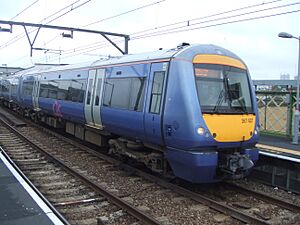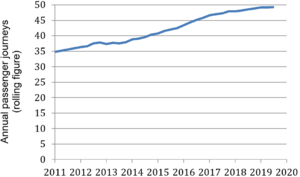C2c facts for kids
| Franchise(s): |
|
|---|---|
| Main route(s): | Fenchurch Street to Shoeburyness |
| Other route(s): |
|
| Fleet size: |
|
| Stations called at: | 28 |
| Stations operated: | 25 |
| National Rail abbreviation: | CC |
| Parent company: |
|
Trenitalia c2c, known simply as c2c, is a British company that runs trains. It operates services for people travelling to and from work or school. These trains run from Fenchurch Street station in London. They go to parts of East London and south Essex. The route is called the London, Tilbury and Southend line.
c2c manages 25 train stations and its trains stop at 28. The company is owned by Trenitalia, which is the main train operator in Italy.
After British railways became private companies, the London, Tilbury & Southend train service was given to a company called Prism Rail. They started running trains as LTS Rail in May 1996. LTS Rail needed to replace its older "slam-door" trains. So, in 1997, they ordered 44 new Class 357 Electrostar electric trains. More trains were ordered later, and all the old ones were replaced by 2003.
In 2000, LTS Rail changed its name to c2c. In the same year, National Express bought Prism Rail. The original agreement for c2c to run trains was supposed to end in May 2011. However, it was extended several times. National Express then won a new agreement in 2014.
Over the years, c2c introduced many new features. In 2007, they added a special braking system to their trains. This system, called regenerative braking, saves energy. In 2008, they created "Quiet Zones" on trains. Passengers were asked not to use phones or play loud music there. In 2017, Wi-Fi became available on trains. They also introduced pay-as-you-go and smartcard tickets.
In February 2017, National Express sold c2c to Trenitalia. In December 2017, c2c ordered six new Class 720 Aventra trains. These trains started running in September 2023. Due to the COVID-19 pandemic, the way c2c operated changed in July 2021. Instead of a franchise, they now have a rail contract. In February 2023, the Department for Transport (DfT) extended c2c's contract until July 2025. c2c was also affected by the 2022–2024 United Kingdom railway strikes.
The company was taken over by DfT Operator when its contract ended on 20 July 2025. This means it is now run by the government.
Contents
How c2c Started and Grew
Early Years (1996–2014)
LTS Rail Takes Over
The train service from London to Tilbury and Southend became a private company. This happened as part of the plan to privatise British Rail. In May 1996, a company called Prism Rail won the right to run this service. They started operating as LTS Rail on May 26, 1996. The agreement was for 15 years. However, it could have been shorter if they didn't replace the old trains.
More people started using the trains than expected. This caused trains to become very crowded during busy times. In 1998, the agreement was changed. It was decided that all old "slam-door" trains would be replaced by March 2002. Also, more staff would be at stations. New information systems and better security were planned. Stations would also be improved for people with disabilities.
LTS Rail started stopping at West Ham station from May 14, 1999. This was because the Jubilee line underground train was extended there. At first, there were limits on how many trains could stop at West Ham during busy times. These limits were removed before the 2012 Summer Olympics.
On July 2, 2000, the company changed its name to c2c. A new website was launched on June 16, 2000, to go with the new name. The company's official name also changed to c2c Rail Limited.
National Express Era
In July 2000, c2c became part of National Express. National Express bought Prism Rail, which owned c2c. The deal was completed on September 19, 2000. National Express then combined the management of c2c and other train companies.
In March 2002, Network Rail took over managing Fenchurch Street Station from c2c.
In January 2005, c2c tried out a TV service on one of its trains. This "360 On-Board Television" service had problems in June 2006 and was stopped.
In June 2006, c2c announced a plan to use X-ray machines and metal detectors. These would be used randomly at stations and on trains. This was done with the police to find people carrying weapons.
A new timetable was introduced in December 2006. It aimed to improve services in the Thurrock and London Riverside areas. But it caused delays and cancellations, so it was stopped in January 2007.
In October 2007, c2c announced "Quiet Zones" on its trains. The first coach of each train became a Quiet Zone. Passengers were asked not to use mobile phones or play loud music. These zones started in early 2008.
Also in October 2007, c2c announced it was using electricity from renewable sources. This was for all its stations, offices, and maintenance areas. It was a big step for a transport company.
The first agreement for c2c was supposed to end in May 2011. But the Department for Transport extended it several times. This allowed them to review how train services were managed. The agreement was finally extended until November 8, 2014.
New Agreements (2014–2025)
On November 9, 2014, National Express won a new 15-year agreement. This was for the Essex Thameside train service. They kept the c2c brand name. c2c also took over managing Fenchurch Street station again.
In December 2015, c2c introduced a new timetable. This was to match changes in how many passengers used different stations. Some passengers were not happy with the changes. They felt c2c was focusing more on short journeys.
Trenitalia Takes Over
In February 2017, National Express sold c2c to Trenitalia. c2c was the last UK train service National Express owned. The company's name then changed to Trenitalia c2c Limited.
On April 1, 2017, c2c started offering free Wi-Fi on its trains. They also launched an entertainment service called Vista. This service partnered with Now TV to offer free TV shows to passengers.
In summer 2019, c2c ran a special weekend service. These trains made fewer stops between Fenchurch Street and Shoeburyness. This added more trains per hour on weekends.
In September 2019, c2c announced a £10 million investment. This was for new self-service ticket machines. These machines are easy to use and can be fixed remotely.
On September 23, 2019, c2c said it would change staffing at some stations. Ticket offices would also have shorter opening hours.
During the COVID-19 pandemic, c2c and the Department for Transport made a special agreement. This changed the terms of their contract from April 2020 to September 2020. Later, the franchise agreement was replaced with a rail contract.
Rail Contract (2021–2025)
On July 19, 2021, the franchise agreement was replaced with a rail contract. This contract was set to end on July 23, 2023.
In May 2022, the timetable was changed. This was to allow for the new London Overground extension. This extension started running in July 2022. It shares some tracks with c2c services.
c2c was one of several train companies affected by the 2022–present United Kingdom railway strikes. These were the first national rail strikes in the UK in 30 years. c2c workers took part in these strikes.
Government Ownership
Before the 2024 United Kingdom general election, the Labour Party said it wanted the British rail network to be owned by the government again. After winning the election in 2024, the government passed a law in November 2024. This law brought passenger rail services back under government control.
In February 2023, the Department for Transport announced that c2c's contract was extended to July 20, 2025. In December 2024, it was confirmed that Trenitalia's contract for c2c would not be renewed. The DfT Operator took over on July 20, 2025.
What Does "c2c" Mean?
The name c2c doesn't have one specific meaning. Many people think it means "city to coast" or "capital to coast." This makes sense because the train route connects London (the capital/city) to the coast of Essex.
The c2c website once said:
The name c2c doesn't mean anything specific. In a sense it can mean anything you want it to. Its uniqueness reflects the young, vibrant character of the people we serve. c2c could stand for coast to capital, or capital to coast. From our point of view, one of the most important things it stands for is commitment to customers.
National Express also used to call the c2c route "City to Coast." c2c used the slogan "way2go" for a while. Later, they used "Making travel simpler," which other National Express companies also used.
Train Services and Routes
c2c runs passenger trains on the London, Tilbury and Southend line. This line goes from Fenchurch Street in London to Shoeburyness in Essex. The distance is about 39 miles (63 km). The main route goes through Basildon. There's also a loop line through Tilbury and a branch line through Ockendon.
c2c trains connect Central London with East London and the southern part of Essex. The fastest journey between Fenchurch Street and Shoeburyness takes 56 minutes.
The Class 357 Electrostar trains can go up to 100 mph (161 km/h). However, the speed limit on the line is 75 mph (121 km/h). Since December 2015, most trains between Fenchurch Street and Barking stop at all stations during busy times. This was part of an agreement from 2014.
As of January 2025, here are the train services during off-peak times (Monday–Friday):
| London, Tilbury and Southend line | ||
|---|---|---|
| Route | tph | Stopping at |
| Fenchurch Street to Shoeburyness via Basildon | 4 |
|
| Fenchurch Street to Southend Central via Ockendon | 2 |
|
| Fenchurch Street to Grays via Rainham | 2 |
|
Using Liverpool Street Station
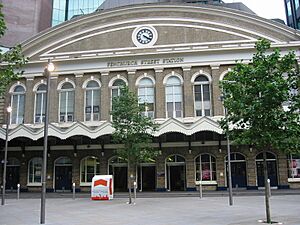
On weekends, c2c runs a few services to London Liverpool Street. These trains turn off the main line at Barking. They stop at Stratford instead of West Ham, Limehouse, and Fenchurch Street. This route can also be used if there are engineering works or problems on the main line. The trains pass through Woodgrange Park, Forest Gate, and Maryland stations without stopping.
Future Plans
A new station called Beam Park is planned. It will be between Dagenham Dock and Rainham. When it opens, it will be part of c2c's Fenchurch Street to Grays via Rainham route.
Tickets and Payments
Since November 3, 2014, c2c has offered tickets on National Rail ITSO smartcards. These are called 'c2c Smart' cards.
You can use Oyster cards for pay-as-you-go travel. This has been available at stations between Fenchurch Street/Liverpool Street and Upminster since January 2004. It was later extended to Dagenham Dock and Rainham in 2008. In January 2010, it was extended to Chafford Hundred, Grays, Ockendon, and Purfleet.
You can also pay by tapping your contactless bank card or smartphone. This is available at all stations between Fenchurch Street/Liverpool Street and Grays. The plan to extend contactless payments to all stations was delayed due to technical issues.
In 2023, c2c teams worked with the British Transport Police to stop people from avoiding paying fares. This effort resulted in over £250,000 in fines in less than a year. From December 3, 2023, new ticket rules were introduced. A new weekday evening peak time was added from 4 pm to 7 pm. During this time, cheaper off-peak tickets could not be used. The very cheapest "Super off-peak" tickets were removed completely.
From January 2024, c2c started accepting electronic tickets. You can buy and store these tickets on your mobile phone. This followed a trial in December 2023.
Train Fleet
Replacing Old Trains
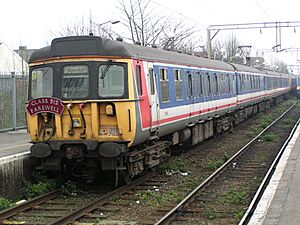
LTS Rail took over a fleet of older "slam-door" electric trains. These included Class 302 , Class 310 , and Class 312 models. The original agreement was to get 25 sliding-door trains from another company. They also had to order 44 new trains. LTS Rail ordered 44 Class 357 Electrostar trains in 1997.
The oldest Class 302 trains were removed from regular service in July 1998. However, both LTS Rail and the other company had more passengers than expected. This meant the other company couldn't provide more trains.
The agreement was changed in November 1998. It was decided that all old LTS Rail trains would be replaced with new ones. The first Class 357 train arrived in 1999. A second order for 28 more Class 357 units was placed in December 1999. This helped meet the promise to increase the number of trains.
There were some problems with the new trains at first. They were sometimes taken out of service during busy times in October 2000. As a result, two extra trains were added to the first order for free. By 2003, c2c was the first train company to have replaced all its old trains with new, accessible ones. The very last "slam-door" Class 312 train ran on March 29, 2003.
Class 357 Trains
In March 2007, c2c started adding regenerative braking to its trains. This made c2c the first UK train operator to use this technology. On June 3, 2007, one train was painted green. It had a slogan saying "All c2c trains are greener now." This was to show that the system was complete. The company said it saved up to 20% on energy.
Sometimes, a few Class 357 trains were out of service. So, in late 2006, two Class 321 trains were rented from another company. They were used for three months during busy weekday hours.
In June 2009, the Class 357 trains started to be repainted. Their original purple-blue and magenta colours were removed. The trains were repainted white with dark blue doors. The last train with the old blue colours ran on March 5, 2011.
Handling Crowds
As part of the 2014 agreement, c2c promised to get new trains. This was to handle the increasing number of passengers. More people started using c2c trains after the Docklands Light Railway station opened at West Ham in 2011. Also, Canary Wharf became a busy financial area.
The Class 357 trains originally had many seats, with a total of 406 spaces. This included 282 seats and room for 124 standing passengers. In late 2015, c2c changed 20% of its carriages. They removed some seats near the doors. This "Metro" setup allowed for more standing room. The Metro trains could hold 556 people, with 222 seats and room for 334 standing. This helped with the large number of passengers travelling shorter distances.
In early 2016, c2c announced it would rent more trains to ease overcrowding. Later that year, they rented six Class 387s for three years. These trains increased capacity on the busiest services. The first Class 387 train started service in November 2016.
Class 720 Trains
In December 2017, c2c announced a deal to get 60 new Class 720 train carriages. These would form six 10-car units (later changed to twelve 5-car units). The plan was for them to start service in 2021. The first train arrived on April 19, 2022. The new fleet started running on September 27, 2023. These trains replaced the six four-car Class 387 units that c2c was renting.
Class 357 Repaint
On May 15, 2024, it was announced that Alstom would paint and repair c2c's Class 357 trains. This work will take 24 months. It includes fixing parts of the train body and repainting all units. This will help the trains last longer. The first refreshed train, 357207, started service on December 10, 2024. Each train takes 20 days to complete.
Current Trains
c2c trains are looked after at East Ham Depot and Shoeburyness Depot.
| Family | Class | Image | Type | Top speed | Number | Carriages | Routes operated | Built | |
|---|---|---|---|---|---|---|---|---|---|
| mph | km/h | ||||||||
| Bombardier Electrostar | 357 | 
|
EMU | 100 | 161 | 74 | 4 | London, Tilbury and Southend line | 1999–2002
Repaint 2024–2026 |
| Alstom Aventra | 720/6 |  |
12 | 5 | London, Tilbury and Southend line | 2022 | |||
Former Trains
Here are some of the trains that c2c used to operate:
| Family | Class | Image | Type | Top speed | Number | Carriages | Routes operated | Built | Left fleet | |
|---|---|---|---|---|---|---|---|---|---|---|
| mph | km/h | |||||||||
| BR First Generation (Mark 1) | 302 | 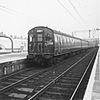 |
EMU | 75 | 121 | 30 | 4 | London, Tilbury and Southend line | 1958–1959 | 1998 |
| BR First Generation (Mark 2) | 310 |  |
35 | 1965–1967 | 2002 | |||||
| 312 |  |
90 | 145 | 25 | 1975–1978 | 2003 | ||||
| BR Second Generation (Mark 3) | 317 |  |
100 | 161 | 18 | 1981–1982, 1985–1987 | 2002 | |||
| 321 |  |
2 | 2007 | |||||||
| Bombardier Electrostar | 387/3 |  |
110 | 177 | 6 | 4 | 2016 | 2022 | ||
How c2c Performs
In the year leading up to July 2024, c2c trains carried 35.8 million passengers. This was an increase of 5.9% from the year before. Passengers travelled a total of 835 million kilometres. This was a 10.6% increase.
During that year, c2c planned over 106,000 train services. This was 3.8% more than the previous year. Of these, 79.7% ran on time. This was an improvement of 2.4%. c2c has 638.3 full-time employees. This number was slightly lower by 0.2%.
 | Valerie Thomas |
 | Frederick McKinley Jones |
 | George Edward Alcorn Jr. |
 | Thomas Mensah |


